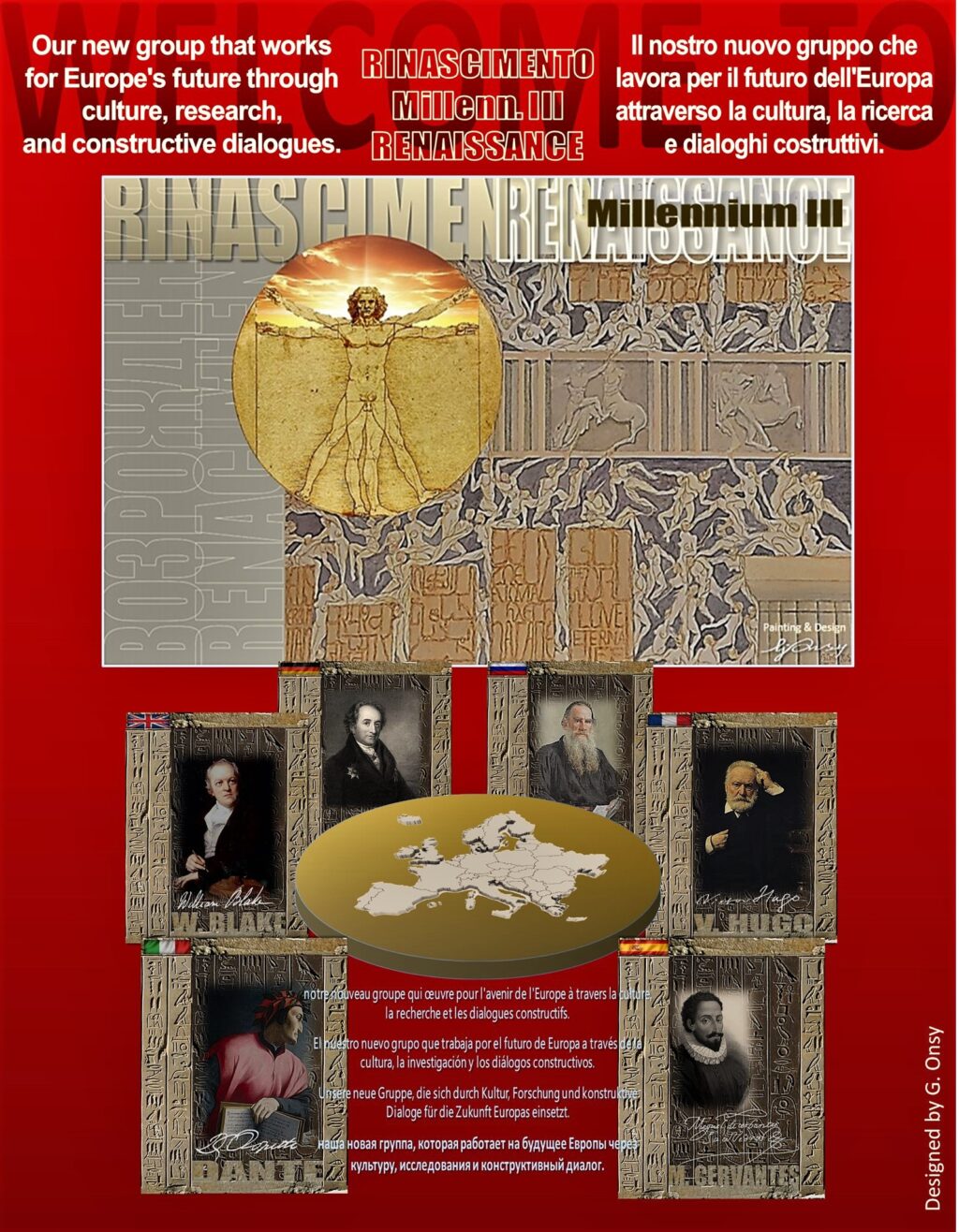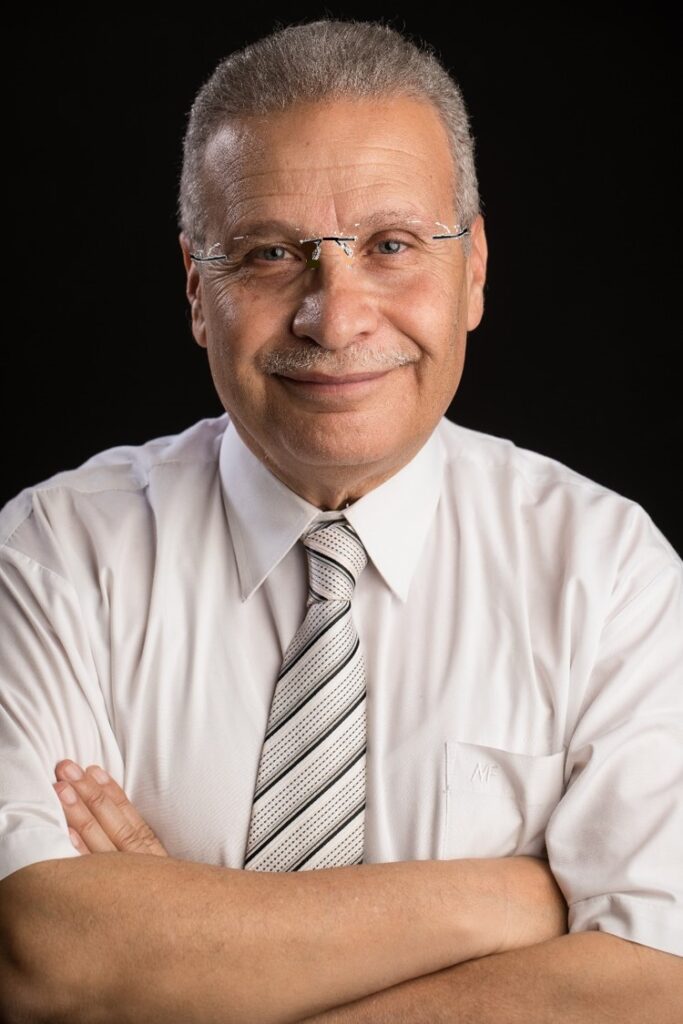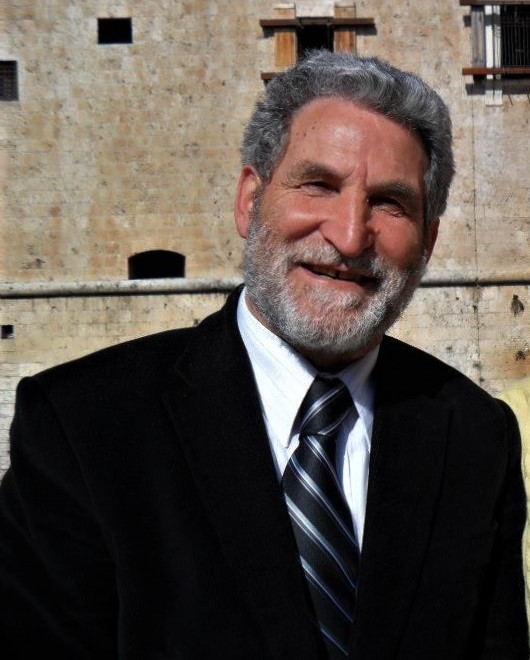RINASCIMENTO Millennium III RENAISSANCE together for the future of Europe

An International Cultural Sociopolitical Association with journalist and writer Goffredo Palmerini as an associate president
by George Onsy *
The International Cultural Sociopolitical Association RINASCIMENTO Millennium III RENAISSANCE is reinforced by the appointment of the Italian journalist and writer Goffredo Palmerini as an associate president. He will join all those who are mentioned here; the founding president of the association, the European Board of Directors, and the Intercontinental Advisor Committee.
RINASCIMENTO Millennium III RENAISSANCE is a new association that works for Europe’s future with a socio-political vision for maintaining harmony among the different social groups in European countries. As the demographic structure of the aging continent will be quite different in a few years, Europe does need a Contemporary Renaissance, a Third Millennium RENAISSANCE that can secure the peaceful balance of its present and future citizens, respecting the original cultures of the immigrants, on one hand, and ensuring their commitment and positive belonging to the European country they have come to settle in, on the other.
It goes without saying that throughout its long history, Europe has given the entire humanity an undeniably great intellectual and spiritual wealth. The international association RINASCIMENTO Millennium III RENAISSANCE has been founded on these principles and values with the participation of many Personalities of Culture, Arts, Media, and various Professions from around the world. Before displaying the needed information on the aims and activities of the association, I would like to mention here below some of the nominees for the Board of Directors and the Advisor Committee:
Governing Bodies of the Association RINASCIMENTO Millennium III RENAISSANCE
Nominated from among international writers, cultural events/organizations presidents,
press/media people, and politicians
George Onsy, Egypt – Founding President
Goffredo Palmerini, Italy – Associate President
CONSIGLIO DIRETTIVO – EUROPA:
Italy: Marina Pratici (writer, poetess, literary critic, cultural event organizer) – Sergio Camellini (psychologist, poet) – Regina Resta (poetess, cultural event organizer, publisher) – Maria Miraglia (professor of literature, writer, cultural event organizer, founder of WFP) – Michela Zanarella (writer, professor, cultural event organizer, poetess) – Franca Colozzo (writer, architect, researcher) – Massimo Massa (writer, cultural event organizer, publisher, poet, artist) – Calogero La Vecchia (cultural event organizer, professor, writer) – Antonio Granai d’Italia Licari (cardiologist, poet) – Elisa Mascia (cultural event organizer, poetess) – Gaia Greco (writer, cultural event organizer) – Maria D’Ippolito (poetess) – Maria Teresa Manta (poetessa, cultural event organizer) – Maria Luisa Gasperini (History reseacher, medical doctor) – Stefano Capasso (cultural event organizer, poet).
France: Sabine Léger (writer) – Catherine Boissaye (poetess).
UK: Nikki De Pina (founder-president of Global Peace, poetess) – Clive Norman (poet) – Gerald Weeks (painter, poet).
Spain: Jose Luis Rubio Zarzuela (editor in chief of Revista Poetica Azahar, poet) – Jose Carlos Arellano Ramos (founder of Radio Magic, poet)- Victoria Elizabeth Nowak (co-founder of Radio Magic, writer) – Jose Santiago (poet).
Germany: Aprilia Zank (professor of literature, writer, poetess, translator) – Elisabeth Dietz (translator).
Austria: Dariusz Pacak (professor, poet).
Netherlands-Cairo: Kees Hulsman (president of Arab-West Report, publisher).
Russia: Anjela Pastnikova (writer) – Olga Nekludova (professor of language and literature) – Elena Guryeva (professor).
Norway: Svanhild Løvli (poetess).
Greece: Eva Potropoylou Lianoy (writer, journalist) – Dimitris P. Kraniotis (poet, medical doctor) – Melina Papa (writer, translator).
Albania: Delo Isufi (lawyer, writer).
Serbia: Marija Najthefer Popov (writer, cultural event organizer).
CONSIGLIO INTERCONTINENTALE DEI CONSULENTI FUORI L’EUROPA:
USA: Joseph Spencer (ambassador of peace, poet) – Renee Drummond Brown (poetess) – Duane Virhees (poet) – Barbara Ehrentreu (writer, poet).
Canada: Ashok K. Bhargava (founding president of WIN Canada, writer, poet) – Thérèse Lepage Lachapelle Bhatnagar (writer) – Ibrahim Honjo (poet).
Latin America: Samuel Cavero (cultural organization founder/president, writer) – Enrique Linero Serrano (cultural organization founder/president, economist, poet) – Graciela Villaverde (writer, cultural event organizer) – Maria Mercedes Castro (poetess) – Alicia Minjarez Ramirez (professor, poetess) – Noe AndresTrujillo (writer) – Manuel Antonio Rodrigez Retamal (founding president of Radio Crysol, writer, poet).
Australia: Nancy Deniss (poetess).
Africa: Ghana: Akua Withmina (educational developer, school principle) – Nigeria: Lamina Kamiludeen (founding president of WIP).
Asia: China: James Tian (journalist, poet) – Zi Zhang (poet, critic, translator, publisher) – Sue Zhu (poetess) – KC Lee (thinker, poet) – Japan: Toshie Tai (lyricist-calligraphic master, poetess)– Korea: Sungrye Han (professor-poetess) – India: Jernail Sing Anand (thinker, writer, poet, publisher) – Jyotirmaya Thakur (poetess, translator, journalist, ambassador of peace) – Poet Priyatosh Das (poet, medical doctor) – Pakistan: Muhammad Shanazar (writer, UN human rights observer, poet) – Bangladesh: Sadia Arman (lawyer, poetess) – Monira Sultana Popy (founding president of HR organizations) –Malesia: Alan Liew (writer, poet) – Philippines: Epitacio Tongohan (founding president of Pentasi B, writer, father of Visual Poetry) – Eden Soriano Trinidad (cultural event organizer, poetess).
The Arab World: Egitto: Mamdouh Abdel-Aziz (journalist) – Alaa Rizk (journalist) – Mandour Saleh Hikel (poet). Libano-Il Cairo: Hana Shishiny (writer, poetess)– Marocco: Monsif Berual (ambassador of pace, poet) –Tunisia: Hayet Haj Khalil (professor, poetess).
It’s quite obvious that contemporary Europe is facing a serious challenge. With the increase of immigration size and the growing number of refugees, the reality of the multiracial structure in many European countries, especially those of Western Europe, should be addressed through a comprehensive cultural and humanistic awareness. Going into more detail, we should start by asking ourselves: What are the risks of a multi-ethnic/multicultural structure for any society or state system? In fact, every country with a rapid demographic change will face at least three challenges. First, convincing the new population to prove their national belonging and loyalty to their present homeland they have come to live in, with balance to their belonging to the original one from which they came. In the case of European countries, such belonging has not been a priority for the ambitious European entrepreneurs and investors who have been and are still concerned to grow, above all considerations, their own business, employing non-Europeans only on the basis of their professionality and hard work. However, it is essential, now more than ever, that the national belonging spirit of all citizens to the present nation should be an absolute priority in order to guarantee a coherent society not threatened by any potential conflicts.
Second, we need to handle with considerable care and sensitivity the socio-cultural differences between indigenous and new European citizens. Third, since most new citizens have religion as an indispensable component of their culture and lifestyle, European governments must adapt their secularism so that it can respect all religious values and practices, on one hand, encourage a sustainable interfaith dialogue, on the other, in each region of their countries. Europe, therefore, must face three challenges in many of its countries: maintaining national belonging, harmonizing the growing multi-ethnic/multicultural structure, and transforming secular-religious tension into tolerance, through cultural understanding and constructive humanistic dialogue.
How to face these challenges?
Europe, above all the other continents of the world, needs to establish and maintain a peaceful balance with effective mechanisms for securing harmony among its multiethnic population of different religious systems, in the present and for the future. This can never be possible without:
1- Enhancing the European identity through academic and practical mechanisms that can modernize the great European heritage in order to meet the actual needs and challenges of both today and tomorrow.
2- Stabilizing the fluctuating relationship between European secularism and religious views and practices through continuous cultural/intellectual/spiritual dialogues, as well as honest cooperation initiatives for the unity and prosperity of the present homeland.
Now, we must ask ourselves HOW can we make that true?
The answer, as it has always been, is a long-awaited Contemporary Renaissance. Yes, RINASCIMENTO Millennium III RENAISSANCE means that the deeply rooted heritage of Europe should not anymore be considered a collection of dead objects exhibited in museums and albums, nor a sophisticated cultural luxury that audiences love to listen to in concert halls and opera houses. The great European civilization that has long been enlightening the whole world with the beams of thought, literature, art, and science should stand giant again with her torch brighter than ever in order to guide the continent, as well as the whole world, towards a better future of peace and stability.
RENAISSANCE Millennium III will bring alive the great cultural forerunners of every European country to give answers to our puzzling questions, which remain without answers. As I did myself and continue to do, calling contemporary Europeans and the whole world to an uninterrupted series of literary/philosophical writings that interview many of those creative pioneers in order to tell us how to deal with today’s deadly pandemic and other ultimate issues. (Welcome to read my series LETTERS TO THE PAST, AN INTERVIEW WITH A SOUL, and DIALOGUES ACROSS THE CENTURIES). In all these literary works I talked about today’s challenges with the Italian: Dante Alighieri, Virgilio, Leonardo Da Vinci, Vitruvius Pollione, Tomaso Albinoni, Cicero, and Julius Caesar, in Italian and Latin, echoing their very voices out of their own writings. I did the same with the French: Victor Hugo, René Descartes, Marc Antoine Charpentier, George de La Tour, André Malraux and the Cathedral of Notre Dame de Paris, in French. With the English: William Shakespeare, William Blake, Duke of Wellington, in English. Also with the Spanish: Miguel Cervantes, Don Juan, and Salvador Dali, in Spanish. With the German: Johann Wolfgang Goethe, Friedrich Schiller, and Ludwig van Beethoven, in German. With the Russian: Lev Tolstoy, the last Tsar of Russia, in Russian)
Through that unique intellectual/spiritual experience, I’ve come to realize that there must always be a reincarnation of the Renaissance at every critical crossroad of human history. Similarly, RINASCIMENTO Millennium III RENAISSANCE will bring to life each and every cultural value of Europe’s great contribution to our planet in order to face all the challenges mentioned above. Yes, facing the first challenge, RINASCIMENTO Millennium III RENAISSANCE will tell us that the national belonging cannot be sold out at a cheap price in order to grow any lucrative activity, however essential it may ever be for the economic stability of any European state. Secondly, RINASCIMENTO Millennium III RENAISSANCE will open our eyes wide to see clearly how different cultures, whether indigenous or new, can be interwoven together in harmony in order to build up a new prosperous civilization that can enrich every European society. RINASCIMENTO Millennium III RENAISSANCE, facing the third challenge, will show how to rationalize European secularism in order to help religiosity bear its divine fruits of conflict-resolution, peacemaking, and humanitarian initiatives, healing the deep wounds of our suffering world. Consequently, we can say that RINASCIMENTO Millennium III RENAISSANCE suggests these approaches and fields of activity:
1 – Dialogue between civilizations/cultures.
2 – Scope of Knowledge and technology.
3 – Analysis of the influence of media and popular arts.
4 – Harmony and dialogue of religions.
5 – A humanistic approach to intellectual/spiritual unification of people of different beliefs:
A. Through art and literature works that unite different people around the Universal and Divine Love
B. A series of presentations on the approach: “LIVING POETICALLY FOREVER” which is an intellectual/spiritual meditation system that helps us enjoy every moment of our life, facing successfully all daily problems.
6 – Solutions from the ancient civilizations’ sources: Egypt’s eternal approach.
7 – Addressing humanitarian issues.
8 – Analyzing laws in the light of human rights.
9 – A new visualization system for analyzing and solving all contemporary problems of high complexity.
10- Projects of sustainable development.
If we accept this plan of RENAISSANCE Millennium III the question about its implementation will certainly be next. How can such a plan be applied? In order to apply its plan, RENAISSANCE Millennium III will consider the cultural institutions as its starting point which will help propagate the needed enlightenment everywhere. However, as those institutions cannot reach all social levels, RENAISSANCE Millennium III should also extend its message through educational institutions to ensure that its values of peace and harmony will be deeply rooted from childhood, evolving from generation to generation in all European countries of the present and the future. The gap between cultural and educational institutions will be bridged by media institutions that will play a key role in spreading the message through all communication channels; press, TV, and the internet. Thus, the three-fold movement, Culture-Media-Education, will be the effective mechanism for implementing the Millennium III RENAISSANCE plan that works seriously to establish and maintain ethnic and cultural harmony between all European communities and social strata, giving also a successful model that can be followed by other countries around the world.
* Founding President of the Renaissance III Millennium, Professor at The Egyptian-Russian University in Cairo, Thinker, Poet, Artist, Researcher on Peace Science, and Advisor/Ambassador for many International Cultural Organizations that work for world peace and conflict resolution.
dr.george.onsy@gmail.com – https://www.facebook.com/onsygeorge

